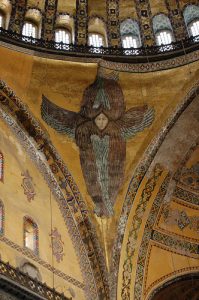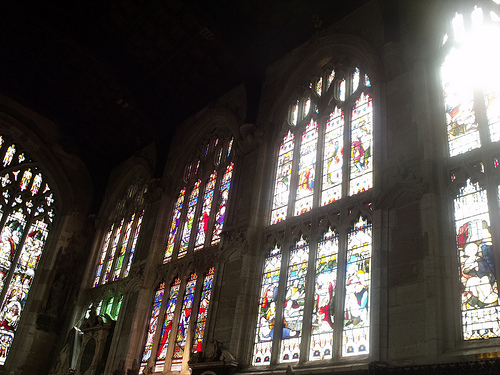Holy Trinity Sunday
June 3, 2012
Then I heard the voice of the LORD saying, ‘Whom shall I send, and who will go for us?’ And I said, ‘Here am I; send me!’ Isaiah 6:8
How do you experience a sense of the Holy, the presence of the Divine One? For some people God is recognized in the worn stone of the world’s great cathedrals, in the smooth patina of polished pews, in the great swell of a magnificent organ under the hands and feet of a master musician, or in the brilliantly-colored shafts of light refracted through intricately designed stained glass windows. In such a place, the word holy takes shape in a sensory swirl of awe and wonder. Other people may encounter God in the wonders of nature–a powerfully thundering waterfall, mighty redwoods reaching toward the heavens, or the ever expanding and velvety night sky twinkling and pulsing with innumerable stars. In both scenarios, the individual becomes keenly aware of his or her smallness and imperfection in the presence of the Creator of the Universe.
 This week’s reading from Isaiah is one of those humbling visions. The prophet’s description of the holiness and majesty of the Divine One drives him to confession, to the stark realization of his sinfulness and unworthiness. When confronted with the Divine Presence, smoke, tremors, and winged seraphs, the speaker cries out, “Woe is me! I am lost, for I am a man of unclean lips, and I live among a people of unclean lips; yet my eyes have seen the King, the LORD of hosts!” (Isaiah 6:5). Clearly this is not the typical 21st century reaction to the Creator of the Cosmos.
This week’s reading from Isaiah is one of those humbling visions. The prophet’s description of the holiness and majesty of the Divine One drives him to confession, to the stark realization of his sinfulness and unworthiness. When confronted with the Divine Presence, smoke, tremors, and winged seraphs, the speaker cries out, “Woe is me! I am lost, for I am a man of unclean lips, and I live among a people of unclean lips; yet my eyes have seen the King, the LORD of hosts!” (Isaiah 6:5). Clearly this is not the typical 21st century reaction to the Creator of the Cosmos.
Nope. Think about it. We try our best to domesticate God, to make God safe, accessible, and user-friendly. Consider the editorial number that’s been done on the radical message of Jesus, rendering his counter-cultural message palatable and possible for consumer cultures. Oh, and the Holy Spirit? Don’t even go there. Save it for the baptismal font and Pentecost. We wouldn’t want to be thought “too far out there” on what some folks would call the “Holy Roller” scale. Let’s have the Trinity in some incomplete metaphors and similes rather than let loose the wildly relational and mind-blowing incomprehensible triune deity hinted at and promised in scripture. That’s some scary stuff; just ask Isaiah.
 Yet this is the very God we need to encounter as we journey through this world of uncertainties and brokenness. We need a God we cannot control. We crave a holy God, a Creator whose very name is enough to shake us to the foundations of our being. We don’t need another American Idol hero or pop music superstar or sports icon to function as our contemporary golden calf. We need, indeed we must have, the God who can cleanse us with a live coal. Systematic theology has its place, but God’s people need redemption that isn’t explained in volumes of difficult prose. We need the taste of bread on our lips and wine on our tongue rather than some prettily-packaged heavenly happy meal. We need to bow our heads in prayer and offer our voices in praise, confident that our salvation cannot be earned, learned, or disbursed at short sale.
Yet this is the very God we need to encounter as we journey through this world of uncertainties and brokenness. We need a God we cannot control. We crave a holy God, a Creator whose very name is enough to shake us to the foundations of our being. We don’t need another American Idol hero or pop music superstar or sports icon to function as our contemporary golden calf. We need, indeed we must have, the God who can cleanse us with a live coal. Systematic theology has its place, but God’s people need redemption that isn’t explained in volumes of difficult prose. We need the taste of bread on our lips and wine on our tongue rather than some prettily-packaged heavenly happy meal. We need to bow our heads in prayer and offer our voices in praise, confident that our salvation cannot be earned, learned, or disbursed at short sale.
You and I, dear friends, need the God who crafted order from chaos and love from death. Don’t overthink the day and the message; don’t try to explain it away with logic and reason. Instead, may mystery, wonder, and awe season your preaching and teaching this week. May your lips burn with holy words of hope, and when the creative, redemptive, and sanctifying presence of the Trinity fills the space wherever the faithful gather in your context, I pray all of you lift your forgiven heads and respond “Here am I; send me!”
In Worship
What hymns of praise might you include this week? How might you place special emphasis on the Sanctus (Holy, Holy, Holy) in response to the reading from Isaiah? What visual images might help you inspire a sense of awe, wonder, and majesty this week? How can you as worship leader(s) reflect your own sense of awe in the presence of the Creator of the Cosmos?
With Youth
Why not spend some time reflecting on the reading from Romans (8:12-17)? Youth often have conflicted feelings about parents as they alternately cling to them for stability and push away from them as they try out their wings of independence. How might you discuss God through this intimate image of parent/child relationship? You might want to look at some resources that discuss the different roles within first century families and contrast how the words might have been heard by Paul’s audience versus a contemporary audience. Be sensitive to those youth who may have difficult relationships at home.
With Children
The Psalms are often overlooked during time with children. Psalm 29 is so rich with imagery of our amazing God and the Psalmist’s response in praise of the Creator, that it is definitely worth considering for your children’s lesson, church, or educational time. Check out Eugene Peterson’s rendering in The Message. Challenge the children to act out the images. Be sure to spend plenty of time talking about the final verse: “God makes his people strong. God gives his people peace” (The Message).
Photos by Elliott Brown, Andrew Gould, and Comedy Nose used under Creative Commons License. Thanks!




Leave a Reply